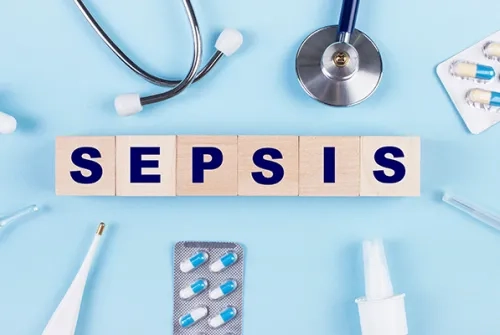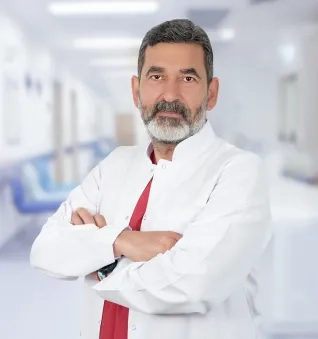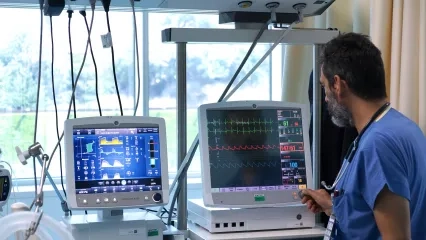Alo Yeditepe
Alo Yeditepe
Things to Know About Sepsis
‘’Even Seconds Can Save Lives in Sepsis, Which Claims the Lives of Millions of People Every Year”
Although great progress has been made in sepsis awareness and care, sepsis remains one of the common and under-recognized diseases in both developed and developing countries. In addition, Intensive Care Specialist of the Department of Anesthesia and Reanimation, Prof.Dr. Tuğhan Utku pointed out that Sepsis is increasingly making its negative effects felt on the healthcare system. Dr. Tuğhan Utku made important statements on the occasion of World Sepsis Day, pointing out that approximately 11 million people die due to sepsis every year in the world.
Pointing out that one person dies every 2.8 seconds all over the world due to Sepsis, which is considered a serious social problem in terms of its effects, Yeditepe University Koşuyolu Hospital Anesthesia and Reanimation Department Intensive Care Specialist Prof. Dr. Tuğhan Utku said, "There are approximately 50 million sepsis cases every year in the world, and approximately 11 million of these cases die."
Explaining that these effects negatively affect both the person's social life and the health system, Prof. Dr. Tuğhan Utku said, “While it creates pressure especially on intensive care units as an acute health problem, its burden on the health economy increases because it is a seriously expensive management process, and its negative effects on social life are evident as it creates loss of work power even after the treatment process, affecting the participation of sick individuals in the production process.” It happens.” he said.
Watch Out for These Warning Signs for Sepsis!
Stating that the symptoms of sepsis can occur at different times and in various situations, Prof. Dr. Utku explained that it often occurs as an overreaction of the body to common and preventable infections that we all know, such as respiratory, gastrointestinal (stomach, intestinal and urinary tract infections) or open wounds. Reminding that sepsis should not be neglected and should be treated urgently, Prof. Dr. Utku said, “Every second is very important in treatment.
Among the main symptoms of sepsis; "If you experience any of the following conditions such as changes in body temperature (fever or low temperature), excessive chills and muscle pain, slurred speech and confusion, severe shortness of breath, inability to urinate for 1 day, feeling like you are going to die and mottling of the skin, a doctor should be consulted immediately."
Correct Timing Saves Lives in Sepsis
Prof. Dr. Utku said that studies carried out around the world to raise awareness about sepsis draw attention to early and rapid diagnosis.
He continued his words by saying “This approach tries to point out the importance of timing and early diagnosis by using the motto “it's about time” for sepsis. In addition, this problem is talked about and recognized more with the discourse of “Say sepsis save lives / Sepsis konuş, hayat kurtar”. It is aimed to raise awareness throughout societies.”
Antimicrobial Resistance is an Invisible Enemy
Reminding that untreated and untreatable infections cause sepsis, Prof. Dr. Utku said “These drug-resistant microbes, also known as superbugs, currently put millions of people at risk of developing a life-threatening, untreatable infection, Underlining that sepsis is one of the most important health complications that can be caused by antimicrobial resistance, Prof. Dr. Utku gave the following information about this serious issue: “Antimicrobial resistance challenges the treatment of sepsis. As more germs become resistant to the antimicrobial drugs used to treat the infection, more people are at risk of developing sepsis. This poses a significant risk in the coming years unless precautions are taken, smart antibiotic use is further encouraged, and public awareness is raised about AMR and sepsis. Antimicrobial resistance means that common medical procedures—dentist visits, caesarean sections (C-sections), hip replacements, chemotherapy, and organ transplants—carry a greater risk of infection. In other words, you may be vulnerable to sepsis after a simple dentist visit and you may even lose your life if sepsis is severe. "It is especially important for individuals over the age of 60 and children under the age of 1 to be very careful about their antibiotic use due to AMR, due to the risk of developing sepsis."
Vaccination is Life Saving for People in Risk Groups
Although everyone has the possibility of having sepsis, especially; Prof.Dr.Utku said that those with chronic diseases, children under one year of age, adults over 60 years of age, those without a spleen and people with suppressed immune systems are in the high risk group. Dr. Utku said, “Especially during the pandemic, vaccination of people in the sepsis risk group has been an important precaution against both Covid-19 and sepsis cases that may result from it.”
Not being late for patients forms the basis of treatment success
Prof Dr. Tuğhan Utku said that ‘’The most important factors that determine the success of treatment in sepsis are; Early clinical diagnosis, early microbiological diagnosis, early initiation of intensive care treatment, reducing the risk of early organ failure and appropriate rehabilitation and appropriate clinical follow-up. Dr. Tuğhan Utku continued his words as follows: “In fact, the reasons for failure are also defined with the same logic. Sepsis patients arrive late in intensive care units. "The late arrival of the patient to the intensive care units, which is the main base of treatment, means the delay of all steps, which is the secret of success."
Attention Should Be Also Considered After Sepsis!
Explaining that even if sepsis is treated on time, attention should be paid to the aftermath. Dr. Tuğhan Utku drew attention to Post-sepsis syndrome, stating that 40% of those who live after having Sepsis suffer from serious and long-lasting effects.
Explaining that the risk of having PSS (Post Sepssis Syndrome) is higher in people who are admitted to the intensive care unit (ICU) and those who stay in the hospital for a long time. Dr. Utku gave the following information on the subject:
“PSS can affect people of all ages. However, older survivors of severe sepsis are at higher risk for long-term cognitive impairment and physical problems than others their age. However, post-sepsis syndrome (PSS) is a condition that affects up to 50% of sepsis survivors; include physical and/or psychological long-term effects. Difficulty sleeping, difficulty either falling asleep or staying asleep, fatigue, drowsiness, shortness of breath, difficulty breathing, muscle weakness or joint pain, swelling in the limbs, recurrent infections, especially in the first few weeks and months following the initial attack of sepsis, loss of appetite, decreased organs Function, for example kidney, liver, heart, hair loss, skin rash are among the physical effects that may be experienced. However, hallucinations, panic attacks, nightmares, decreased cognitive (mental) functionality, loss of self-esteem, depression, mood swings, difficulty concentrating, memory loss and post-traumatic stress disorder are also among the psychological or emotional effects of PSS.”
About
Faculty and Year of Graduation:
İstanbul University Cerrahpaşa Faculty of Medicine, 1990
”
See Also
Alo Yeditepe




